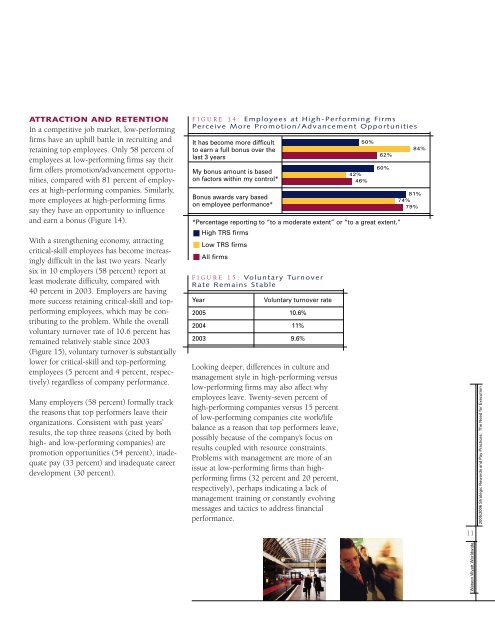The Need for Execution - San Antonio Compensation Association
The Need for Execution - San Antonio Compensation Association
The Need for Execution - San Antonio Compensation Association
Create successful ePaper yourself
Turn your PDF publications into a flip-book with our unique Google optimized e-Paper software.
ATTRACTION AND RETENTION<br />
In a competitive job market, low-per<strong>for</strong>ming<br />
firms have an uphill battle in recruiting and<br />
retaining top employees. Only 58 percent of<br />
employees at low-per<strong>for</strong>ming firms say their<br />
firm offers promotion/advancement opportunities,<br />
compared with 81 percent of employees<br />
at high-per<strong>for</strong>ming companies. Similarly,<br />
more employees at high-per<strong>for</strong>ming firms<br />
say they have an opportunity to influence<br />
and earn a bonus (Figure 14).<br />
With a strengthening economy, attracting<br />
critical-skill employees has become increasingly<br />
difficult in the last two years. Nearly<br />
six in 10 employers (58 percent) report at<br />
least moderate difficulty, compared with<br />
40 percent in 2003. Employers are having<br />
more success retaining critical-skill and topper<strong>for</strong>ming<br />
employees, which may be contributing<br />
to the problem. While the overall<br />
voluntary turnover rate of 10.6 percent has<br />
remained relatively stable since 2003<br />
(Figure 15), voluntary turnover is substantially<br />
lower <strong>for</strong> critical-skill and top-per<strong>for</strong>ming<br />
employees (5 percent and 4 percent, respectively)<br />
regardless of company per<strong>for</strong>mance.<br />
Many employers (58 percent) <strong>for</strong>mally track<br />
the reasons that top per<strong>for</strong>mers leave their<br />
organizations. Consistent with past years’<br />
results, the top three reasons (cited by both<br />
high- and low-per<strong>for</strong>ming companies) are<br />
promotion opportunities (54 percent), inadequate<br />
pay (33 percent) and inadequate career<br />
development (30 percent).<br />
FIGURE 14: Employees at High-Per<strong>for</strong>ming Firms<br />
Perceive More Promotion/Advancement Opportunities<br />
It has become more difficult<br />
to earn a full bonus over the<br />
last 3 years<br />
My bonus amount is based<br />
on factors within my control*<br />
Bonus awards vary based<br />
on employee per<strong>for</strong>mance*<br />
Looking deeper, differences in culture and<br />
management style in high-per<strong>for</strong>ming versus<br />
low-per<strong>for</strong>ming firms may also affect why<br />
employees leave. Twenty-seven percent of<br />
high-per<strong>for</strong>ming companies versus 15 percent<br />
of low-per<strong>for</strong>ming companies cite work/life<br />
balance as a reason that top per<strong>for</strong>mers leave,<br />
possibly because of the company’s focus on<br />
results coupled with resource constraints.<br />
Problems with management are more of an<br />
issue at low-per<strong>for</strong>ming firms than highper<strong>for</strong>ming<br />
firms (32 percent and 20 percent,<br />
respectively), perhaps indicating a lack of<br />
management training or constantly evolving<br />
messages and tactics to address financial<br />
per<strong>for</strong>mance.<br />
50%<br />
42%<br />
46%<br />
62%<br />
60%<br />
*Percentage reporting to “to a moderate extent” or “to a great extent.”<br />
High TRS firms<br />
Low TRS firms<br />
All firms<br />
FIGURE 15: Voluntary Turnover<br />
Rate Remains Stable<br />
Year<br />
Voluntary turnover rate<br />
2005 10.6%<br />
2004 11%<br />
2003 9.6%<br />
84%<br />
81%<br />
74%<br />
79%<br />
2005/2006 Strategic Rewards and Pay Practices: <strong>The</strong> <strong>Need</strong> <strong>for</strong> <strong>Execution</strong><br />
11<br />
Watson Wyatt Worldwide


